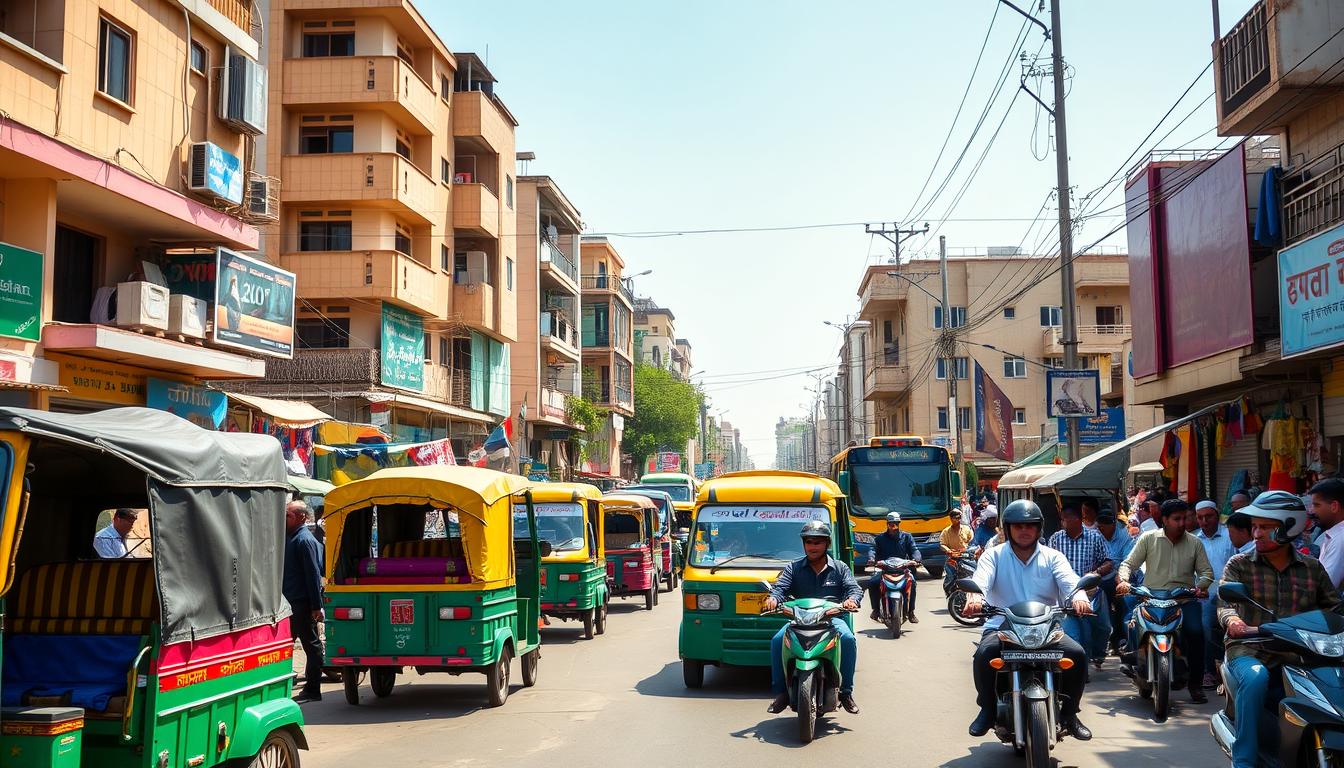Pakistan’s transport system is diverse and dynamic. It connects people, goods, and services across the country. From Karachi’s busy streets to Gilgit-Baltistan’s rugged terrains, transport is key to the country’s economy and society.
This article will guide you through Pakistan’s transport infrastructure. We’ll look at different transport modes, the sector’s challenges and opportunities, and efforts for sustainable mobility.
Key Takeaways
- Discover the diverse transportation options available in Pakistan, including road networks, railways, aviation, and urban mobility systems.
- Gain insights into the challenges and opportunities within the country’s transport sector, such as infrastructure development, public-private partnerships, and technological advancements.
- Explore the role of cargo logistics and supply chain management in Pakistan’s regional and global trade connections.
- Understand the initiatives and efforts towards creating a more sustainable and eco-friendly transportation system in Pakistan.
- Learn about the government’s plans and strategies to improve the overall transportation infrastructure and connectivity across the nation.
Transport in Pakistan: An Overview
Pakistan’s transport network is diverse and key for connecting regions and boosting the economy. It includes roads, railways, and aviation, all working together. This system is vital for the country’s mobility and trade.
Pakistan’s Diverse Transportation Landscape
The transport sector in Pakistan offers many options, like roads, railways, aviation, and cargo logistics. These pakistan transportation systems help move people and goods efficiently. They link cities, remote areas, and global markets.
Challenges and Opportunities in Pakistan’s Transport Sector
Pakistan’s transport infrastructure has grown a lot, but it still faces challenges. These include gaps in infrastructure, limited access in some areas, and the need for greener transportation modes. Yet, these issues also offer chances for new ideas, investments, and better policies to tackle transport sector challenges in Pakistan.
“Pakistan’s transportation network is the lifeblood of the nation, connecting communities, fueling economic growth, and shaping the country’s future.”
By tackling the transport sector’s diverse needs, Pakistan can open up new paths for growth, economic development, and better connectivity for everyone.
Road Network: The Backbone of Pakistan’s Transportation
Pakistan’s pakistan road network is vast, with key highways and motorways. It’s the heart of the country’s transport system. It links cities and towns, making travel easy.
Major Highways and Motorways in Pakistan
The Karakoram Highway and the Indus Highway are highlights. They connect Islamabad to China and Karachi to Peshawar. These roads have cut down travel times, helping people and goods move faster.
Intercity and Intracity Road Transportation Options
Pakistan offers many ways to travel long distances. You can take buses, drive, or share a taxi. For city trips, buses, taxis, and rickshaws are the go-to choices. They’re cheap and handy for locals.
| Transportation Mode | Intercity | Intracity |
|---|---|---|
| Buses | ✓ | ✓ |
| Private Cars | ✓ | ✓ |
| Taxis | ✓ | ✓ |
| Rickshaws | ✓ |
Pakistan’s road network and transport choices are key. They help move people and goods, boosting the economy and improving lives.
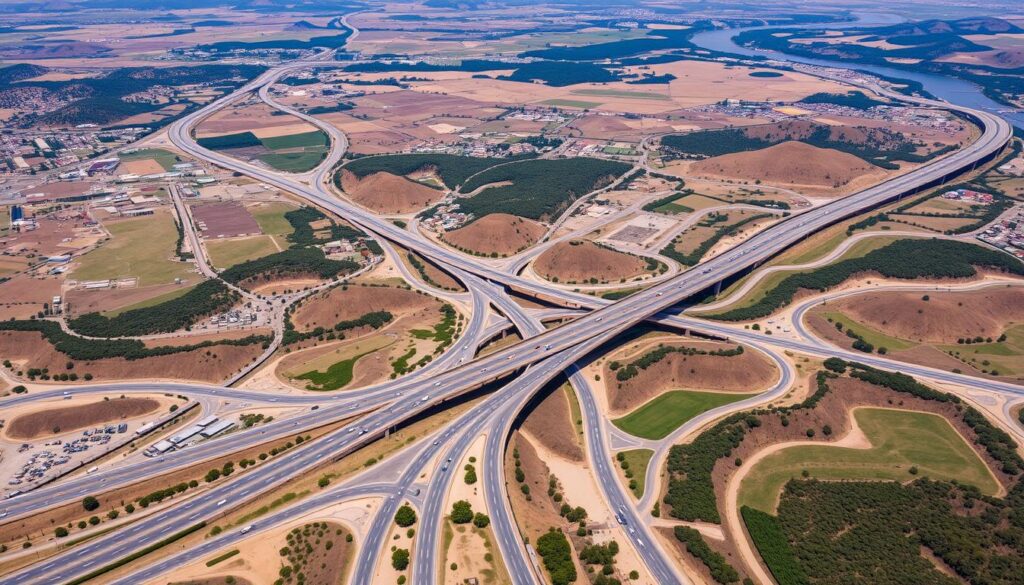
Railways: The Historic Mode of Transportation
The Pakistan railways have been key in the country’s transport for years. They go back to the colonial times. Today, they are a main way to connect cities and towns across Pakistan.
The rail infrastructure in Pakistan is huge, with over 7,000 kilometers of track. It links big cities and remote areas. The railways help the economy grow and bring people together.
Despite old infrastructure and problems, Pakistan Railways is getting better. They are updating signals, buying new trains, and improving stations. This makes traveling by train more comfortable and reliable.
| Key Routes | Frequency of Trains | Average Travel Time |
|---|---|---|
| Karachi to Lahore | Multiple daily departures | 12-14 hours |
| Islamabad to Peshawar | Several trains per day | 3-4 hours |
| Quetta to Karachi | Daily service | 8-10 hours |
The Pakistan railways are changing for the better. The government and others are working to grow the rail infrastructure. They want to make the railways a big part of Pakistan’s transport system.
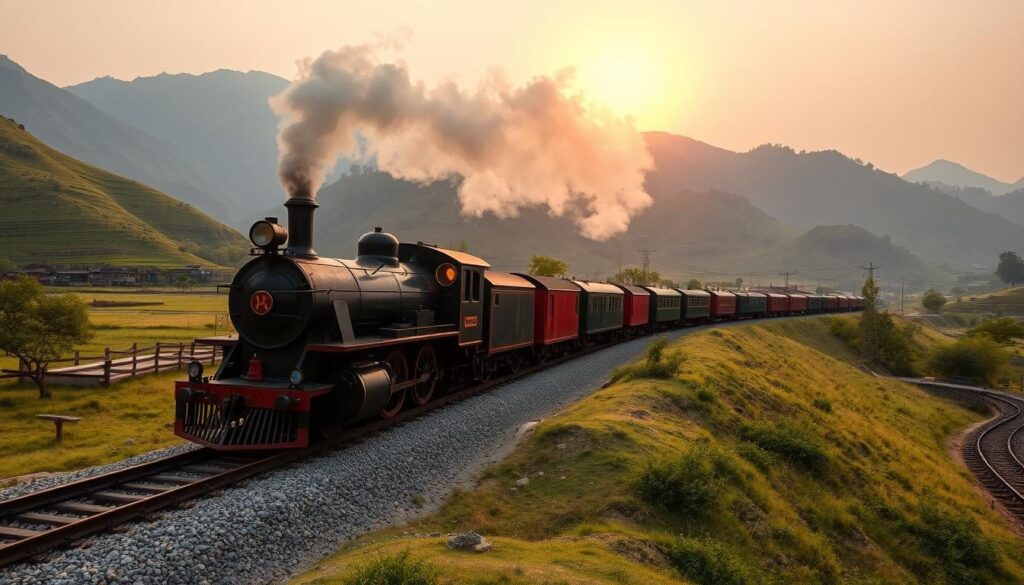
Aviation Industry: Taking to the Skies
Pakistan’s aviation industry is key for both passenger and cargo transport. It offers a wide range of domestic flights and international flights. This meets the growing need for air travel. The air cargo logistics sector also supports trade, making Pakistan important in the global supply chain.
Domestic and International Air Travel Options
Travelers in Pakistan have many domestic flights to choose from. Airlines like Pakistan International Airlines (PIA), SereneAir, and AirBlue connect major cities. This makes travel easy and efficient.
For those wanting to travel abroad, Pakistan’s international flights network is vast. It reaches major hubs in the Middle East, Europe, and Asia. There are also direct flights to North America and other places. This network makes travel smooth and supports business and cultural exchange.
Air Cargo and Logistics in Pakistan
Pakistan’s aviation industry is also vital for moving goods through air cargo logistics. Airports and freight services help with imports and exports. This includes everything from fresh items to valuable goods. The air cargo network helps Pakistani businesses grow, boosting the economy.
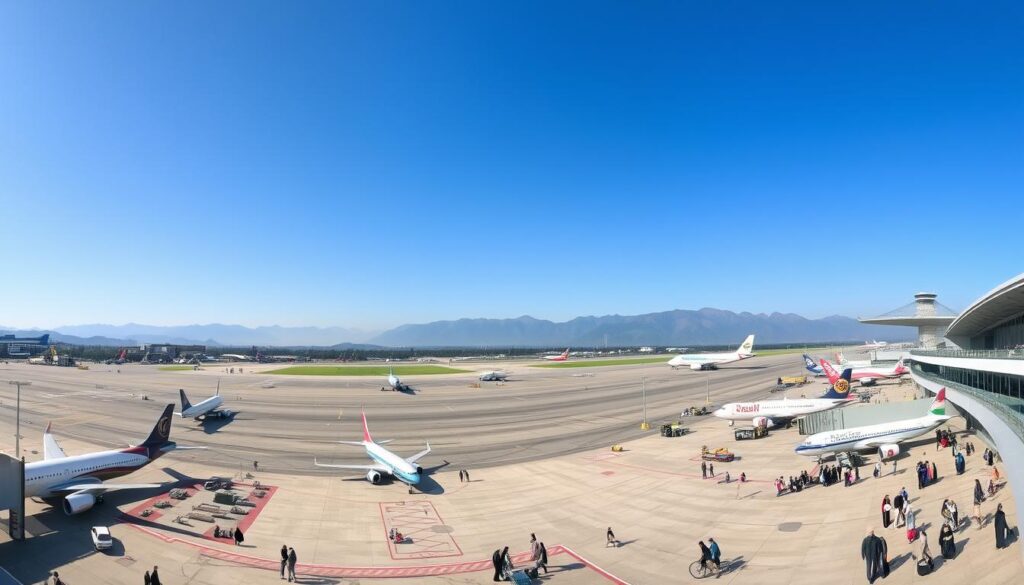
“Pakistan’s aviation industry is poised for continued growth, driven by the increasing demand for both domestic and international travel, as well as the growing need for efficient air cargo logistics.”
The aviation sector in Pakistan is set to grow. This growth will help the country take advantage of air travel and cargo markets. It will also strengthen Pakistan’s role as a major transportation hub.
Urban Mobility: Navigating Cities and Towns
Traveling through Pakistan’s busy cities is exciting, thanks to the many public transport options. You can find everything from traditional buses and rickshaws to modern metro rails. These choices make it easy for both locals and visitors to get around.
Public Transport Systems in Major Cities
Karachi, Pakistan’s biggest city, has a wide bus network. It includes both government and private buses. The Karachi Circular Railway is another key service, offering a rail-based way to travel.
Lahore, known for its culture, has the Lahore Orange Line Metro Train. This modern rapid transit system has greatly improved travel in the city.
Other big cities like Rawalpindi, Faisalabad, and Multan are also improving their transport. They offer buses, rickshaws, and sometimes metro or light rail systems. These options meet the needs of their growing populations.
Challenges and Solutions for Urban Transportation
Even with progress, Pakistan’s cities still face many transport challenges. Issues like overcrowding, poor infrastructure, and traffic jams are common. To solve these problems, new ideas are being tried.
These include special bus lanes, smart traffic systems, and combining different transport ways. By tackling these challenges, Pakistan’s cities aim to offer better travel experiences. This will improve life quality and support sustainable growth.
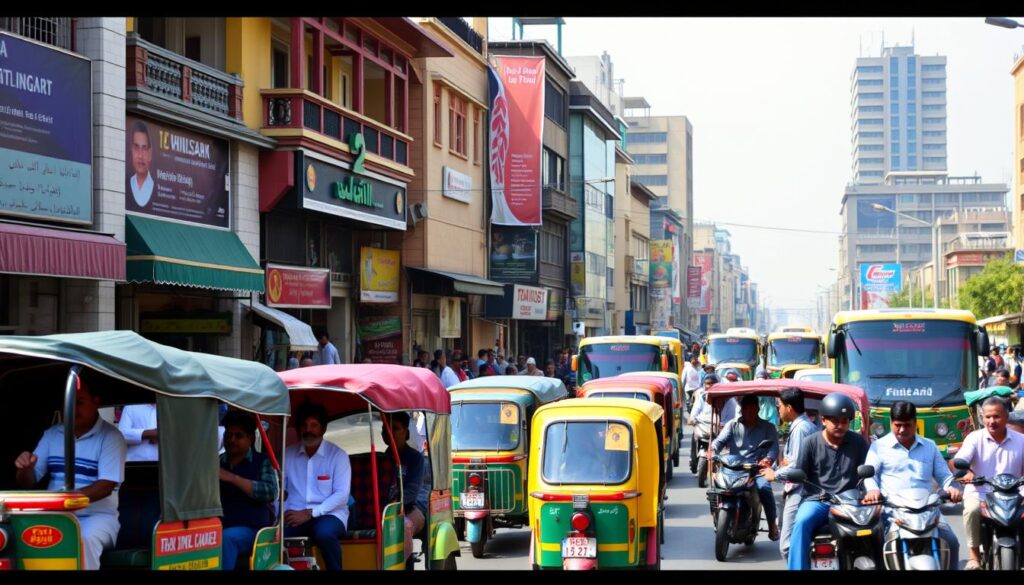
Transport in Pakistan: Connecting Remote Areas
Pakistan’s cities have better transport systems, but rural areas face big challenges. They need new ways to get people and goods around. This is crucial for the local people.
Rural Transportation Options and Challenges
Getting around in rural Pakistan is tough. Pakistan rural transportation often depends on local groups. They use shared vehicles to help connect places.
These efforts help solve the transportation challenges in rural areas. They make it easier for people to get to where they need to go.
- Community-based transport, like shared vehicles, is key in rural areas. It helps connect villages and towns.
- Rural areas lack good roads and public transport. This makes it hard to get to important services and jobs.
- People are trying new things, like motorcycles and three-wheeled vehicles. They aim to improve travel in areas with poor roads.
To tackle these transportation challenges, Pakistan needs a variety of solutions. They are working on better roads, supporting local transport, and finding green ways to connect rural areas.
“Reliable and accessible transport is essential for the development and prosperity of Pakistan’s rural communities. Connecting these areas to the broader transportation network remains a key priority.”
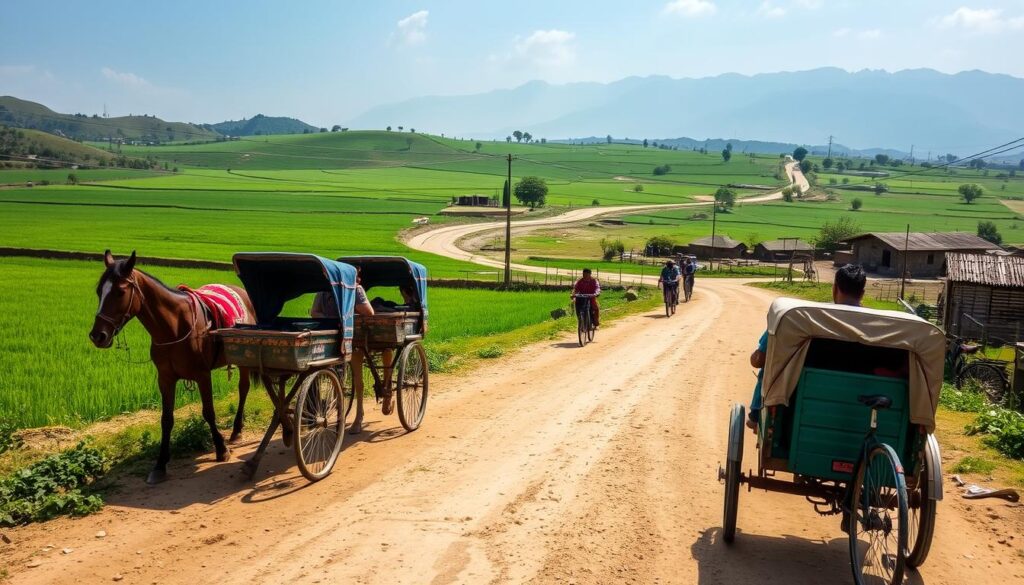
Cargo Logistics and Supply Chain Management
Pakistan’s transportation system is key for trade in the region and worldwide. It has strong cargo logistics and supply chain management. Being at the crossroads of South Asia, Central Asia, and the Middle East, Pakistan is a vital gateway for pakistan cargo logistics and supply chain management.
Pakistan’s Role in Regional and Global Trade
Pakistan’s location and growing transport network make it important in trade. Its seaports, airports, and roads and rails are crucial for moving cargo logistics and goods. This helps in efficient trade across borders.
In Pakistan’s cargo logistics and supply chain management, key players include the Pakistan Customs and logistics providers. They work together to move goods smoothly. This makes Pakistan competitive globally.
Improving Cargo Logistics and Supply Chain Efficiency
Pakistan knows how vital cargo logistics and supply chain management are for its economy. It’s working to make its transport network better. This includes modernizing ports, improving roads and rails, and using digital tech.
The government and industry leaders are also working together. They aim to fix customs clearance, logistical bottlenecks, and infrastructure gaps. This will make Pakistan’s logistics efficiency better, making it a top choice for trade.
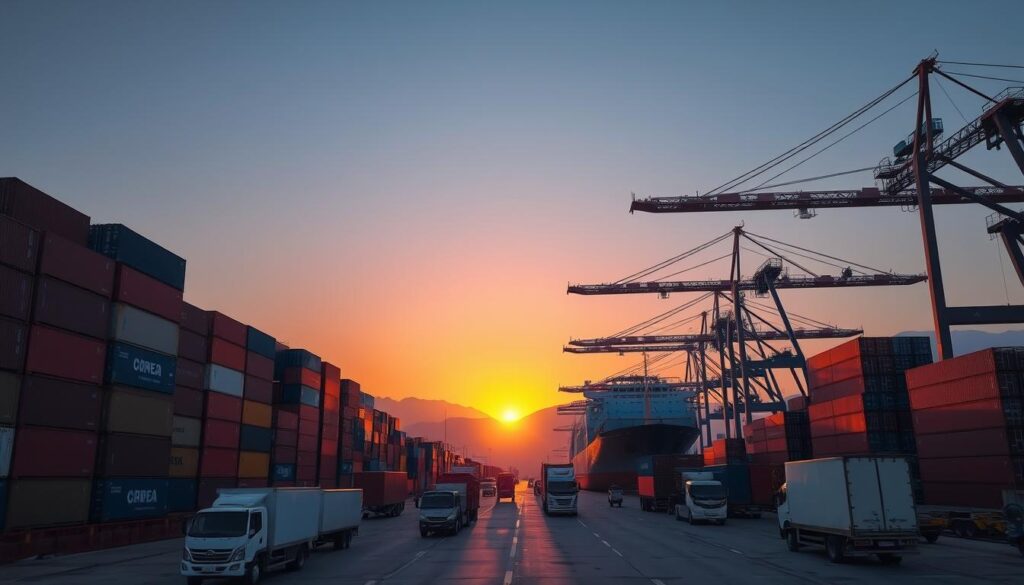
| Key Factors | Impact on Cargo Logistics and Supply Chain |
|---|---|
| Strategic geographic location | Positioning Pakistan as a vital gateway for regional and global trade |
| Expanding transportation infrastructure | Enhancing connectivity and efficiency of cargo logistics and supply chain operations |
| Collaboration among stakeholders | Streamlining processes and addressing challenges to improve logistics efficiency |
| Government initiatives | Modernizing infrastructure and leveraging digital technologies to optimize supply chain management |
Pakistan is committed to making its cargo logistics and supply chain management better. This is key for its success in regional and global trade. By improving logistics efficiency, Pakistan aims to be a major hub for goods movement.
Sustainable Transportation: The Future of Mobility
Pakistan is leading the way in making transportation more eco-friendly. The country is focusing on electric vehicles and better public transit. These steps aim to make mobility more sustainable and green.
Initiatives for Sustainable and Eco-Friendly Transportation
Pakistan is pushing hard for electric vehicles. The government offers tax breaks and is setting up charging stations. This move is to cut down on carbon emissions and use less oil.
The country is also upgrading its public transit. New bus systems and metro lines are being built in cities like Lahore and Karachi. These changes help reduce traffic and make cities cleaner.
Pakistan is also looking into other fuels like CNG and biofuels. This move helps lessen environmental harm and supports a greener future for travel.
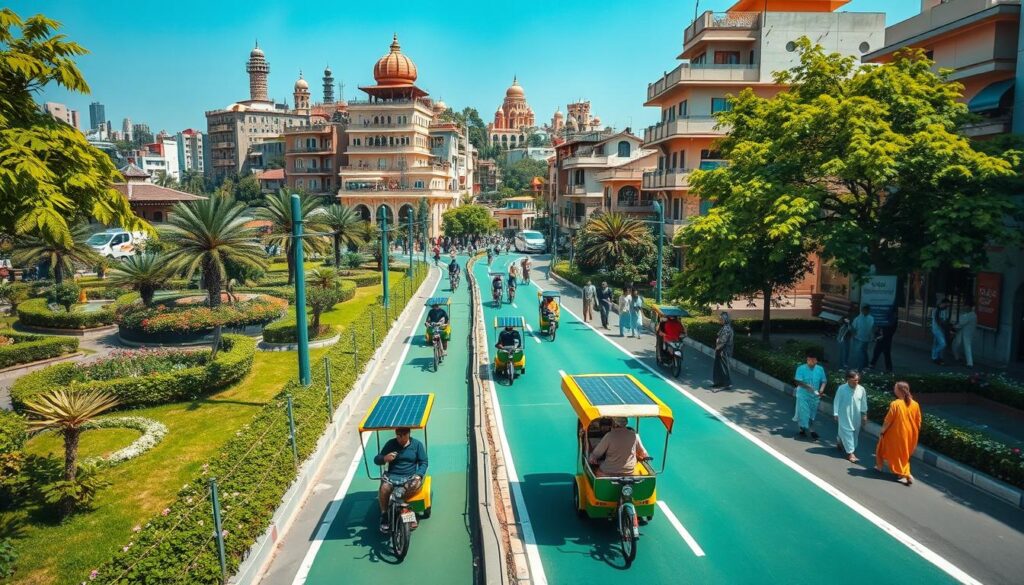
“The transition towards sustainable transportation is not just an environmental imperative, but also a strategic necessity for Pakistan’s long-term development and competitiveness.”
Pakistan’s efforts in sustainable transport are making a big difference. The country is becoming a model for others. It shows how to make travel better for the planet and people.
Conclusion
Pakistan’s transportation scene is changing fast and is key to the country’s growth. It has a wide road network, a historic railway, and a growing air travel industry. Plus, it’s exploring new ways to move people around cities.
The country still has challenges but also chances to grow in transport. Fixing infrastructure, making travel smoother, and going green are top goals. With new tech, better policies, and teamwork, Pakistan can make its transport system better. This will help the economy, connect people, and make life better for everyone.
This article has given a deep look into Pakistan’s transport world. It helps people understand and move around the country more easily. By focusing on all aspects of transport, Pakistan can build a brighter future. This will benefit everyone, from individuals to businesses and the nation.
FAQ
What are the key modes of transportation in Pakistan?
Pakistan has a variety of ways to get around. You can use roads, railways, air travel, and cargo logistics.
What are the major highways and motorways in Pakistan?
Pakistan has built key roads like the Karakoram Highway and the Indus Highway. These roads are important for traveling between cities.
How has the railway system in Pakistan evolved?
Pakistan’s railways have a rich history, starting in the colonial era. They still play a big role in moving people and goods around the country.
What are the domestic and international air travel options available in Pakistan?
Pakistan’s aviation industry is key for both people and cargo. It offers many flights within the country and to other places.
What are the public transport systems available in major Pakistani cities?
In big cities, you can find buses, metro rails, and rickshaws. These help people get around the city.
How are remote and rural areas in Pakistan connected?
Connecting rural areas is tough. But, there are efforts to improve this. Community-based solutions and ongoing projects aim to help.
What is Pakistan’s role in regional and global trade through its cargo logistics and supply chain management?
Pakistan’s transport system is vital for trade. It helps with cargo and supply chain management, both locally and globally.
What initiatives are underway to promote sustainable and eco-friendly transportation in Pakistan?
Pakistan is looking into green transport options. This includes electric vehicles, better public transit, and using new fuels to lessen environmental harm.
- Transport in Pakistan: An Overview
- Road Network: The Backbone of Pakistan's Transportation
- Railways: The Historic Mode of Transportation
- Aviation Industry: Taking to the Skies
- Urban Mobility: Navigating Cities and Towns
- Transport in Pakistan: Connecting Remote Areas
- Cargo Logistics and Supply Chain Management
- Sustainable Transportation: The Future of Mobility
- Conclusion
- FAQ
